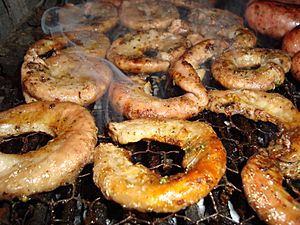Chunchullo facts for kids

Chunchulines being roasted using charcoal.
|
|
| Place of origin | Latin America |
|---|---|
| Region or state | North America and South America |
| Main ingredients | Pork, beef, or lamb small intestine |
Chunchullo (pronounced choon-CHOO-yoh) is a special dish made from the small intestine of animals like beef, pork, or lamb. It's often grilled or fried until it's crispy and delicious. This unique food is enjoyed in many countries across Latin America.
In some places, chunchullo is cooked over wood or charcoal, giving it a smoky flavor. Countries like Colombia, Argentina, Paraguay, Uruguay, Peru, and Chile usually roast it. Even though it takes a long time to cook, it's often the very first dish served at a big barbecue party called an asado in Paraguay, Uruguay, or Argentina.
Chunchullo is often prepared in a fun way, shaped like a braid before it's cooked.
Contents
Different Names and Ways to Enjoy Chunchullo
Chunchullo has different names and is prepared in slightly different ways depending on where you are in Latin America.
Argentina, Uruguay, and Paraguay
In these countries, it's known as chinchulín and is usually roasted. They also have something called tripa gorda (meaning 'big tripe'), which is the large intestine. It's cooked similarly, but sometimes it's cleaned and filled with ingredients, just like sausages.
Chile
In Chile, this dish is simply called chunchules.
Colombia
Depending on the area in Colombia, you might hear it called chunchullo, chunchulla, chinchurria, or chunchurria. It's often eaten fresh after being cooked.
Ecuador
In the cooler parts of Ecuador, it's known as tripa mishqui. It's roasted and sometimes served with boiled potatoes or a corn dish called mote. In warmer areas, it's called tripita. This version is grilled and is a popular street food.
Venezuela
In Venezuela, this tasty dish is called chinchurria and is typically roasted until it's ready to eat.
Peru
In Peru, this meal has a special local name: choncholi. It's first steamed and then roasted on a grill. This food was originally brought to Peru by people from Angola who came to work on cotton and sugar farms. While it used to be a food mainly for the black population of Peru, today it's enjoyed by everyone, much like kebabs.
Mexico
In southern Mexico, the first part of the cow's small intestine is called tripa de leche (meaning 'milk tripe'). It's carefully washed, braided, and then boiled in a pressure cooker for about an hour because it's quite tough. After that, it's fried with garlic and onions. It's often served on warm tortillas, either whole or chopped into small pieces, with spicy salsa.
See also
 In Spanish: Chinchulín para niños
In Spanish: Chinchulín para niños
 | Audre Lorde |
 | John Berry Meachum |
 | Ferdinand Lee Barnett |

